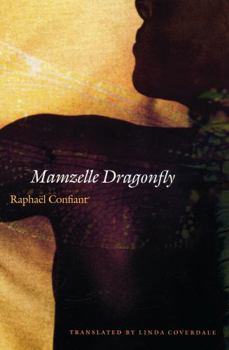Mamzelle Dragonfly
Select Format
Select Condition 
Book Overview
Trapped in the cane fields of Martinique, Adelise, delicate and flighty as a dragonfly, has found a way to keep her hard life separate from her secret soul. But when she is forced to move from her village to Fort-de-France, the island's unruly capital, and her aunt introduces her to the unsavory business of nightlife among the mulatto elite, Adelise must draw on ever more tenuous resources to remain free. Set against the politically charged backdrop of mid-twentieth-century Martinique, the story of this unlikely heroine's struggle unfolds in a language at once precise and enchanting, bringing to life both the inevitable harshness of life on Martinique and its inescapably lush beauty.
Format:Paperback
Language:English
ISBN:0803264186
ISBN13:9780803264182
Release Date:September 2001
Publisher:Bison Books
Length:169 Pages
Weight:0.43 lbs.
Dimensions:0.4" x 5.3" x 8.0"
Customer Reviews
1 rating
"Tree of Life"
Published by Thriftbooks.com User , 23 years ago
...P>Adelise is like a dragonfly "fluttering over waterlilies," says her mother. "'You ? refuse to admit life isn't a game.'" Certainly life is no game in the midcentury communities of poor people on the Caribbean island of Martinique. So Adelise's mother believes in thinking "every evening on all the things you promised yourself to accomplish during the day," and "giv[ing] in to contentment" only if one promise was perfectly kept. But Adelise, even at seventeen, gives in only to dreams. Since childhood her closest friend has been a backyard tree, "busy shedding its old flowers and making fresh ones ? in a kind of rippling shimmy." What her mother doesn't know is that a few years ago Adelise was repeatedly raped by the local caneworkers' overseer. But "I didn't feel a thing," Adelise tells herself, and as she grows older she reflects, "I couldn't love anyone. Only my tree and its little white flowers had the power to move my heart." <p>Adelise's mother wants to save her daughter from the heavy labor in sugarcane fields that made her an old woman at forty, so she sends Adelise to live with her pretty Aunt Philomene in the city. The aunt's home turns out to be in a slum, a "great plain swarming with shacks all tumbled together in the most perfect disorder and crossed by a muddy path dotted with wallowing pigs." But Adelise learns how to survive. If she must sell her body to do so, her soul remains strictly her own. <p>"Mamzelle Dragonfly" serves up small slices of hardscrabble life with cool, casual precision. For its characters each day is merely another "day in the stream of time." Passions tend to be uncomplicated spasms of lust, wrath, sorrow, or fear, and hope is "the sterile male papaya's when it goes ahead and flowers." If the unfazed tone (in conjunction with the setting) recalls certain writings by Jamaica Kincaid and Edwidge Danticat, this book is more disconcerting. Kincaid's novels are partly arguments about colonialism in which the political awareness of her narrators suggests that one can make historical sense, at least, of life's flux; and Danticat's taut narrative lines firmly contain what might fall into confusion. But in Confiant's novel, events seem to happen for no reason. The effect is a peculiar feeling of vulnerability - the reader, like the book's characters, lives in the present moment with little warning of what comes next. Narrative direction is implied only occasionally, as when Adelise recalls the beloved tree behind her rural home and notes with mild surprise that she's become a city girl. <p>Holding the book together, besides its focus on Adelise's life between childhood and the age of twenty-six, is the author's voice: a blend of matter-of-fact reportage, coarse vulgarity, and song. Confiant is a Martinique citizen who wrote his novel in his native Creole and translated it into French, then turned it over to translator Linda Coverdale (who produced the glorious English version of Sebastien Japrisot's "A Very Long Eng






